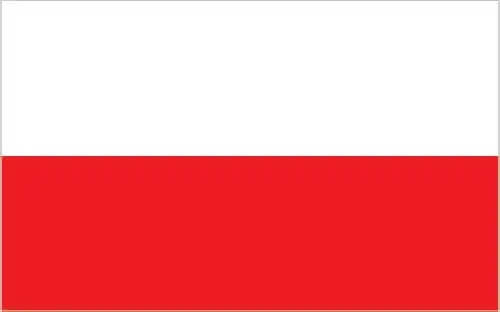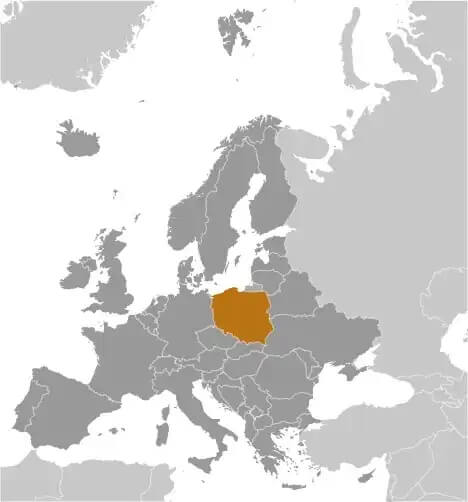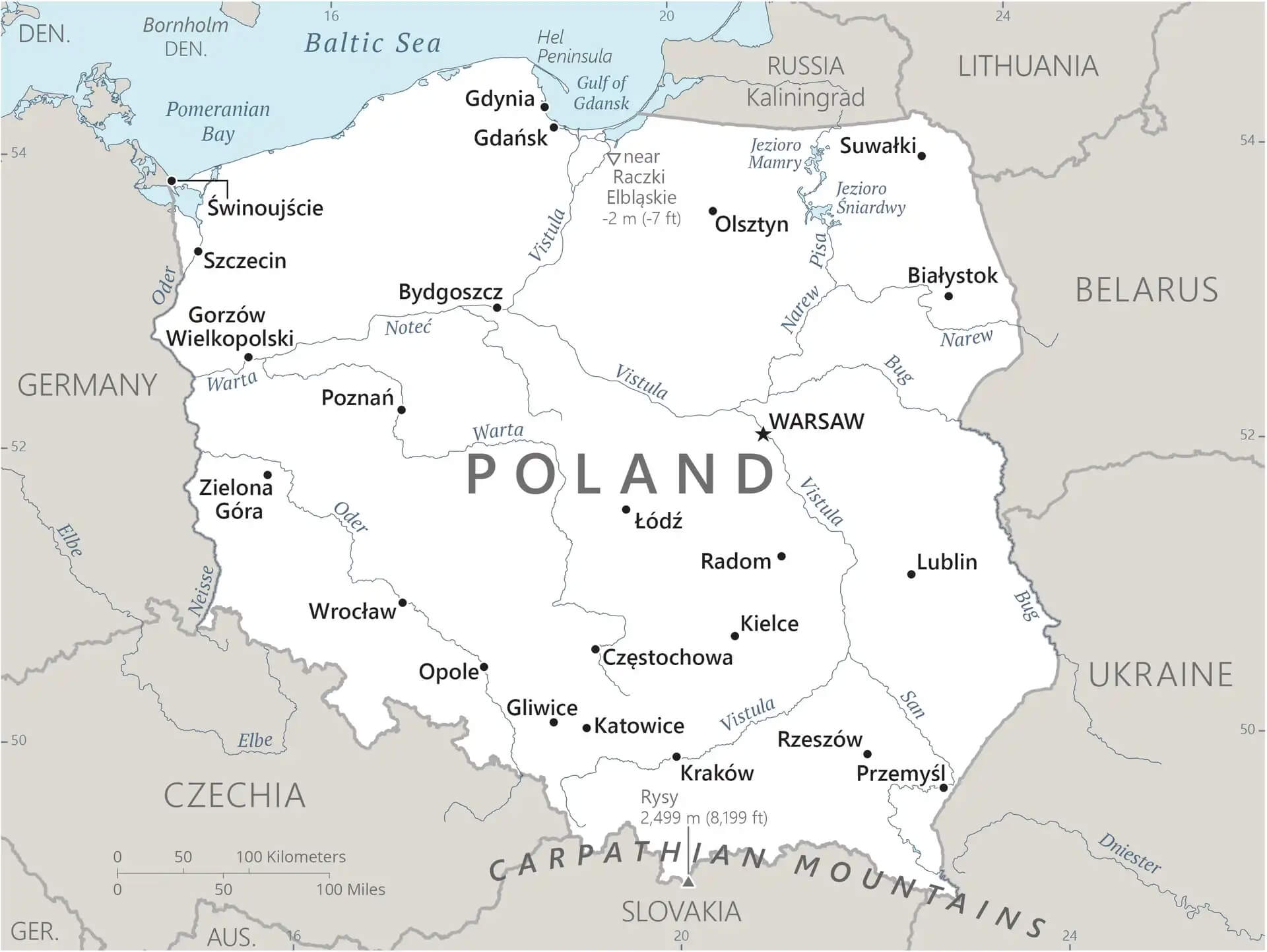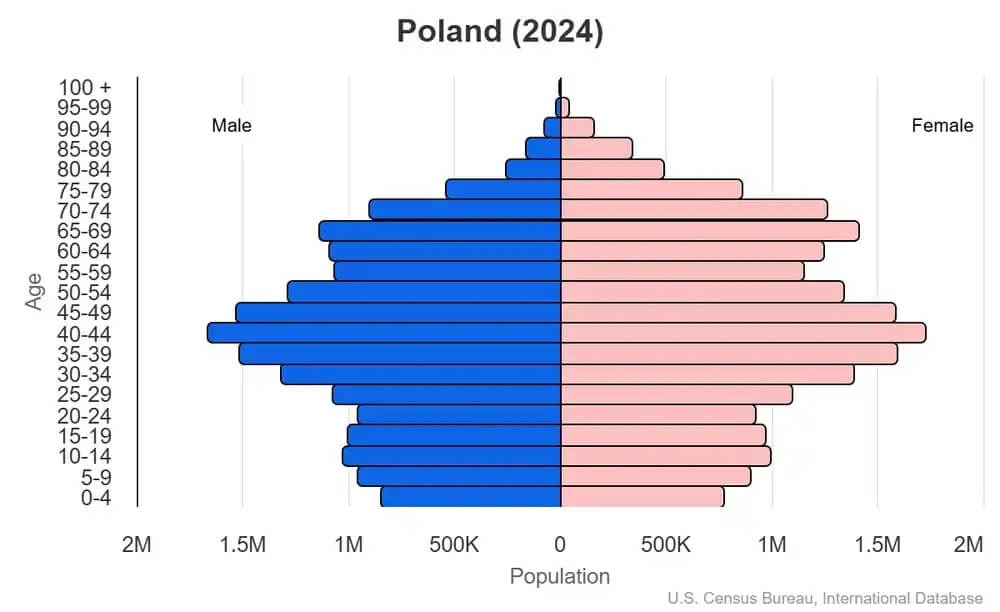World Book
Poland
World Book Index
76


With a score of 76, the country is ranked 33th out of 158 countries in the World Book ranking. (more information)
Introduction
By the mid-16th century, the Polish-Lithuanian Commonwealth ruled a vast tract of land in Central and Eastern Europe. During the 18th century, internal disorder weakened the nation, and in a series of agreements between 1772 and 1795, Russia, Prussia, and Austria partitioned Poland among themselves. Poland became a Soviet satellite state after World War II. Free elections in 1989 and 1990 brought the communist era to a close.
Neighboring countries
Belarus - Czechia - Germany - Lithuania - Russia - Slovakia - Ukraine
Geography
Area
total: 312,685 sq km
land: 304,255 sq km
water: 8,430 sq km
Climate
temperate with cold, cloudy, moderately severe winters with frequent precipitation; mild summers with frequent showers and thundershowers
Natural resources
coal, sulfur, copper, natural gas, silver, lead, salt, amber, arable land
People and Society
Population
total: 38,746,310 (2024 est.)
Ethnic groups
Polish 96.9%, Silesian 1.1%, German 0.2%, Ukrainian 0.1%, other and unspecified 1.7% (2011 est.)
Languages
Polish (official) 98.2%, Silesian 1.4%, other 1.1%, unspecified 1.2% (2011 est.)
Religions
Roman Catholic 70.7%, refused to answer 20.9%, no religion 6.9%; less than 1 percent: Orthodox, Jehovah Witness, Evangelic of Augsburg, Greek Catholic, Pentecostal, other Protestant, not stated, old Catholic Mariavite Church, other Christians, Islam, Buddhist, Polish Catholic Church, other, Baptist Union of Poland, Pagan, Seventh Day Adventist, Hindu, other Catholic (2021 est.)
Population growth rate
-1% (2024 est.)
Government
Government type
parliamentary republic
Capital
name: Warsaw
Executive branch
chief of state: President Karol NAWROCKI (since 6 August 2025)
head of government: Prime Minister Donald TUSK (since 11 December 2023)
Diplomatic representation in the US
chief of mission: Ambassador (vacant); Chargé d'Affaires Bogdan Adam KLICH (since 21 November 2024)
Diplomatic representation from the US
chief of mission: Ambassador (vacant); Chargé d’Affaires Stephanie HOLMES (since August 2025)
Economy
Economic overview
high-income, diversified, EU-member economy; significant growth in GDP, trade, and investment since joining EU in 2004; private consumption and EU-funded public investments driving GDP growth; increased social spending, flooding recovery costs, and defense spending have added to public debt
Real GDP (purchasing power parity)
$1.649 trillion (2024 est.)
$1.602 trillion (2023 est.)
$1.598 trillion (2022 est.)
Real GDP per capita
$45,100 (2024 est.)
$43,700 (2023 est.)
$43,400 (2022 est.)
Exports
$478.579 billion (2024 est.)
$471.571 billion (2023 est.)
$436.388 billion (2022 est.)
Exports - partners
Germany 25%, UK 6%, Czechia 6%, France 6%, Italy 5% (2023)
Exports - commodities
vehicle parts/accessories, electric batteries, plastic products, cars, seats (2023)
Imports
$441.945 billion (2024 est.)
$423.797 billion (2023 est.)
$421.765 billion (2022 est.)
Imports - partners
Germany 22%, China 12%, Italy 5%, Netherlands 4%, USA 4% (2023)
Imports - commodities
crude petroleum, cars, garments, vehicle parts/accessories, plastic products (2023)
Human Development Index
The country's Human Development Index (HDI) is 0.906, ranking it 35th out of 193 countries tested. (more information)
World Happiness Report
The World Happiness Report ranked the country 43rd out of 158 countries tested with a score of 6.287. (more information)



